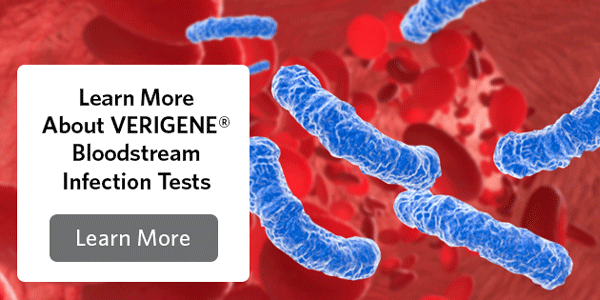Assay works directly with blood culture bottles in a streamlined workflow

At Jena University Hospital, microbiologists are using rapid molecular blood culture tests with the VERIGENE® System to improve care for patients with bloodstream infections. Dr. Jürgen Rödel, associate professor of microbiology and head of bacteriology at the 1,500-bed teaching hospital, has spent more than 20 years at the institution working in both the research and diagnostic settings.
At the hospital, the lab processes about 35,000 blood cultures every year. Sepsis is a major area of focus for the facility, which includes a specialized Center for Sepsis Control and Care. During his time leading bacteriology for the clinical lab, Rödel and his team have worked to incorporate other PCR-based diagnostics directly with blood samples, but most commercial options are very difficult to integrate into a routine workflow, he says. PCR-based systems typically require batch runs, so samples can’t be run immediately. Also, the assays often require more hands-on time, so they cannot be run in the evening or on weekends. These obstacles were deal-breakers for Rödel and his team, who need to be able to report results for these cases as quickly as possible.
Simple, Reliable System
What the team really needed was clear: a simple, reliable assay system that could generate results quickly straight from blood culture bottles as soon as they appear positive for some type of infection. “The most important aspect for success was easy, continuous integration into a daily workflow,” Rödel said. Traditional blood culture-based testing can take days to return more specific results, either for pathogen identification or for antibiotic resistance markers. That’s far too long to make a meaningful impact on treatment selection.
So Rödel turned to VERIGENE Blood Culture Nucleic Acid Tests, molecular diagnostic assays that detect a broad range of common pathogens, as well as antibiotic resistance markers. “This is a great advantage of the VERIGENE System,” Rödel said. The team implemented this test in 2013, and analyses conducted since then have shown that more than 90% of positive blood cultures were correctly characterized by the BC-GN and BC-GP tests, indicating that the panels not only have high sensitivity and specificity, but that it also covers the vast majority of pathogens responsible for bloodstream infections.
Results in Two Hours
The BC-GN and BC-GP tests have dramatically accelerated the lab’s reporting time. As soon as a blood culture comes back positive, the bottle is tested with VERIGENE using a streamlined workflow that can be handled easily by anyone in the lab and requires minimal hands-on time, Rödel said. The test returns results in just two hours, a full day sooner than would be possible with blood cultures and phenotypic resistance assays. “This is very important for treatment decisions for physicians,” he noted.
Learn more about the VERIGENE Blood Culture Nucleic Acid Tests and the VERIGENE System.
Related Content
- A 5-year Study of the Performance of the VERIGENE® Gram-Positive Blood Culture Panel in a Pediatric Hospital [Journal Article]
- It’s Time to Talk About Blood Poisoning [Blog]
- Sepsis Guidelines and Diagnostics: Current Impact and Future Outlook [MLO Online]
- Webinar: The Clinical and Economic Case for Rapid Sepsis Diagnostics [Webinar]
- Bloodstream Infection Product Portfolio [Web Page]
